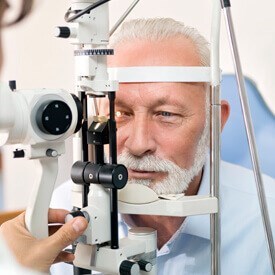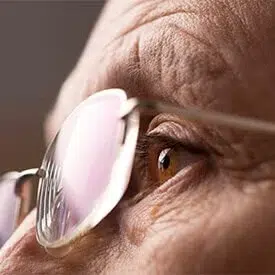Our Services
Cataract Procedures
Cataracts are the clouding of the eye’s natural lens, which often leads to gradual vision loss. Cataracts can be treated with a widely-performed surgery that replaces the eye’s clouded lens with a new, clear artificial lens. Our expert cataract surgeons at MidAmerica Surgery Center in Chesterfield, MO provide state-of-the-art cataract care, getting you back to enjoying your best vision.

Cataract Procedures
During cataract surgery, the eye’s natural clouded lens is replaced with an artificial intraocular lens (IOL). This surgery can significantly improve vision that is threatened by cataracts. Our professional ophthalmologists in Chesterfield, MO routinely perform this common surgery to help patients achieve their best vision and improve their overall quality of life.

Premium Cataract Upgrades & IOLs
Premium Intraocular Lenses (IOLs) offer cataract patients the opportunity to further improve their vision after surgery. MidAmerica Surgery Center in Chesterfield, MO provides the latest in implantable technology and surgical equipment. Speak to one of our skilled ophthalmologists about our Premium IOL options, and we can help you select a lens that fits your needs, lifestyle, and budget.

Laser Cataract Surgery
Laser-assisted cataract surgery is performed utilizing a femtosecond laser. The use of the laser allows for precise incisions and bladeless cataract removal, which leads to less chance of complication and a shorter recovery period. If you are looking for an advanced option for your cataract surgery, speak to our expert ophthalmologists in Chesterfield, MO about laser cataract surgery.

Refractive Cataract Surgery
Patients who are interested in reducing their dependence on glasses or contacts following cataract surgery can choose to undergo Refractive Cataract Surgery and have their natural lens replaced with a Premium Intraocular Lens. Refractive Cataract Surgery can correct issues like nearsightedness or farsightedness. Our ophthalmologists in Chesterfield, MO can discuss options for vision improvement with you.

Astigmatism Management Procedure (LRI)
Following cataract removal, minor astigmatism can be treated with Limbal Relaxing Incisions or LRIs. Small incisions are made around the iris to encourage the cornea to reshape itself into a more ideal curvature. Recovery from an LRI procedure is relatively quick and patients should notice an improvement in vision as they recover. Our ophthalmologists in Chesterfield, MO may recommend LRIs to help attain optimal vision after cataract surgery.
Glaucoma Treatment
Uncontrolled eye pressure causes damage to the optic nerve, which results in the vision condition glaucoma. Glaucoma is one of the leading causes of vision loss in persons over 60, and as it initially presents no symptoms, it is important to have routine checkups with your ophthalmologist. Our Chesterfield, MO ophthalmologists offer many effective surgical options for lowering eye pressure and preserving your vision.

SLT Laser Treatments
A selective laser trabeculoplasty (SLT) is an advanced procedure to treat the rising intraocular pressure that causes glaucoma. During SLT, laser energy is used on the trabecular meshwork, stimulating more fluid to drain from the eye, which helps to lower intraocular pressure. SLT is ideal for patients with open-angle glaucoma. Talk to our ophthalmologists in Chesterfield, MO about how SLT can help your glaucoma.

MIGS
Minimally invasive glaucoma surgery encompasses a number of procedures designed to treat glaucoma while using the most advanced techniques and minimally invasive tools. The goal of MIGS is to reduce eye pressure while also minimizing the chance of complication and shortening the recovery timeframe. Our ophthalmologists in Chesterfield, MO proudly perform several different types of procedures that are classified as MIGS.

LPI (Laser Peripheral Iridotomy)
A laser peripheral iridotomy is a treatment for closed-angle glaucoma. During the procedure, a laser is used to create a hole in the outer edge of the iris, which opens the angle and allows fluid to escape through a new channel. The laser peripheral iridotomy carries a very low risk of complication and is effective in lowering intraocular pressure. Consult with one of our ophthalmologists in Chesterfield, MO at MidAmerica Surgery Center to learn if this procedure could help control your glaucoma.

Trabeculectomy
A trabeculectomy is a glaucoma surgery that helps drain fluid from the eye and control intraocular pressure. During a trabeculectomy, your ophthalmologist creates a flap in the white part of the eye, the sclera. A channel for fluid to drain from the eye is created beneath the flap. Escaping fluid forms a bleb, or small bubble, under the upper eyelid and then is safely reabsorbed into the surrounding blood vessels. If medication alone has not controlled your eye pressure, you may be a candidate for the trabeculectomy. Contact our ophthalmologists in Chesterfield, MO to learn more.

Advanced Glaucoma Procedures
Certain types of glaucoma, including malignant glaucoma, may be highly resistant to medications and previous surgery. In order to control intraocular pressure and preserve vision, our skilled ophthalmologists can perform advanced glaucoma treatments that include shunts and valves. During one of these procedures, a small medical device is implanted in the eye to help fluid safely drain. If previous surgery has not effectively controlled your glaucoma, contact our team to learn more about these advanced options.
Cornea
The cornea is the clear front window of the eye. It protects the eye from dirt and germs while also playing a key role in vision. As light enters the eye, the cornea’s curved dome refracts it, allowing you to focus. If the cornea is diseased, damaged, or misshapen then it can negatively impact vision. Our expert ophthalmologists at MidAmerica Surgery Center in Chesterfield, MO can effectively treat diseases and conditions of the cornea, allowing for ideal vision in our patients.

Treatment of Keratoconus
Keratoconus is a progressive condition of the cornea where the cornea begins to thin and gradually changes into a more cone-like shape. Patients with keratoconus may experience blurred vision and increased sensitivity to light. Our ophthalmologists at MidAmerica Surgery Center can help treat and manage keratoconus with special lenses, or in advanced cases, a corneal transplant.

Corneal Transplant
If the cornea has been significantly scarred or damaged from illness or injury, then a corneal transplant may be recommended in order to achieve optimal vision. In a corneal transplant, healthy corneal tissue from a human donor is used to replace the damaged cornea. Our ophthalmologists at MidAmerica Surgery Center can perform partial or full corneal transplants depending on where the damage is located.

DMEK
Descemet membrane endothelial keratoplasty (DMEK) is a type of partial corneal transplant where only the innermost endothelial layer of the cornea is replaced. Our ophthalmologists in Chesterfield, MO recommend this type of corneal transplant for patients who have diseases that cause swelling in the innermost layer of the cornea. DMEK is highly effective at helping patients attain better vision and carries a low risk of complications.

DSEK
Descemet’s stripping endothelial keratoplasty (DSEK) is a type of partial corneal transplant that replaces the damaged or diseased posterior portion of a patient’s cornea with healthy cornea tissue from a human donor. DSEK is performed with small surgical incisions and no corneal sutures, which allows for less chance of complication. DSEK can help restore vision for patients who have experienced damage to the endothelial layer of the cornea due to disease or trauma.

DALK
Deep anterior lamellar keratoplasty (DALK) is a type of partial corneal transplant where the innermost layer of the cornea (the endothelium) is left intact, and the outermost layers of the cornea are replaced with healthy cornea tissue from a human donor. The donor tissue is sutured into place over the patient’s endothelium. DALK has a shorter recovery timeframe and less chance of complication or rejection than a full corneal transplant.

Corneal Laser
Our ophthalmologists at MidAmerica Surgery Center proudly perform laser eye surgeries in Chesterfield, MO to correct many common refractive errors that cause problems with vision. If you are nearsighted, farsighted, or have astigmatism, laser eye surgery may help reduce or eliminate your dependence on glasses or contacts. Laser eye surgery reshapes the curvature of the cornea to help refract light for more perfect vision.

Implantable Contact Lenses
An alternative to laser eye surgery, the ophthalmologists at MidAmerica Surgery Center proudly offer implantable contact lenses in Chesterfield, MO to help reduce or eliminate a patient’s dependence on glasses or contacts. To correct vision, a small lens is implanted in the eye behind the iris and in front of the eye’s natural lens. Once in place, the lens can remain in the eye indefinitely or be removed in case of vision change or complication.
*Individual results are not guaranteed and may vary from person to person. Images may contain models.